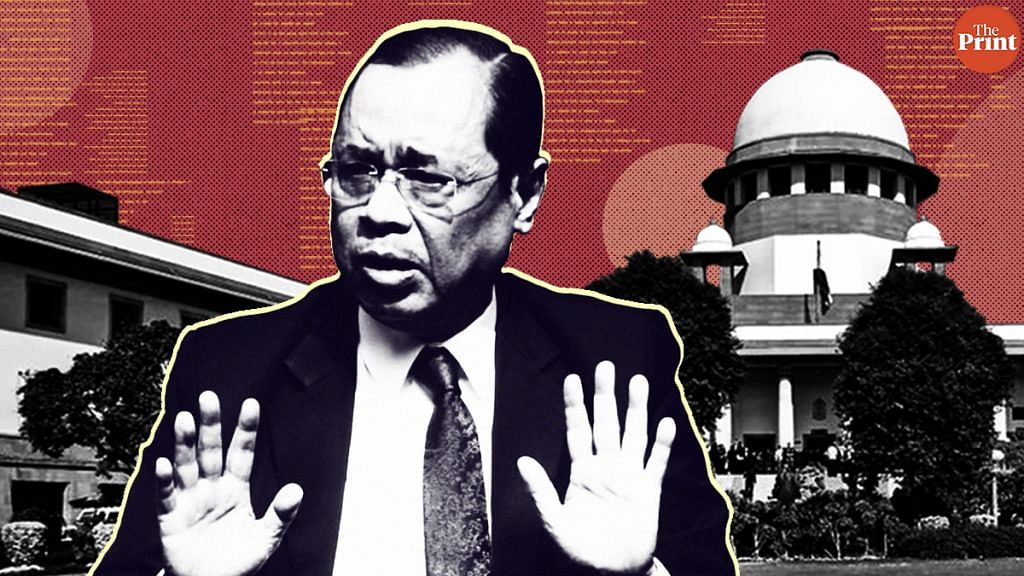When former Supreme Court Justice Ranjan Gogoi and three other judges – most senior after then Chief Justice Dipak Misra – trooped out to the lawns of the official residence of Justice Jasti Chelameswar to hold a press conference in January 2018 to express concern over the arbitrary manner in which Misra was running the top court, many said Gogoi would be a shining example of integrity and propriety when he ascends to the top position.
Misra was allegedly assigning sensitive cases to select judges, taking pending cases out of the hands of senior judges like Justice Chelameswar and handing them to benches headed by other judges.
Weeks after Ranjan Gogoi assumed office as the Chief Justice of India, he showed to the entire world that his words at the historic 2018 press conference meant little.
But he still had the opportunity to politely refuse the Narendra Modi government nomination to the Rajya Sabha, made public Monday evening. But Gogoi, on Tuesday, justified his acceptance saying, “[it will] be an opportunity to project the views of the judiciary before the legislative and vice versa.”
Someone as sharp as Justice Gogoi should have known to turn down the nomination given the widespread condemnation.
But, if history has taught us anything, the chances of that happening are as likely as the top five loan defaulter-businessmen paying back every penny plus interest owed by them to India.
There are several reasons why Justice Gogoi will take oath as a Rajya Sabha MP in the next few days. Here are some.
Also read: ‘Rebel’ judge to Rajya Sabha: Ex-CJI Ranjan Gogoi hurting SC image or being harshly judged?
He wanted it and worked to get it
While the Narendra Modi government may want the gullible to accept the explanation that the Rajya Sabha nomination is an honour granted to those who have immensely contributed to society in their chosen field, the fact is that it is seldom the case. For example, Sachin Tendulkar, who might have had a blink-and-you-miss-it tenure as a nominated MP, did carry the weight of the lofty expectations of a billion-plus people every time he entered the cricket field; or eminent lawyer Fali Nariman, who has remained a strong and passionate conscience keeper of the higher judiciary.
But in recent times, the Rajya Sabha nomination has been used to reward those who toe a particular line.
As CJI, Justice Gogoi often attracted, not always baseless, the charge that he was currying favour with the Modi government, using his power as master of the roster to ensure that the government arguments always managed to prevail in politically-sensitive cases.
Since his retirement, there were enough indications to suggest he wanted a post-retirement job. His decision to shift base to Assam – his home-state – after retirement was always viewed with a bucketful of suspicion. However, Justice Gogoi isn’t the first judge or retired CJI to curry favour with the government of the day with an eye on a cushioned, post-retirement job.
Compared to governorship (former CJI P. Sathasivam) or NHRC chairman (former CJI H.L. Dattu), being a mere nominated Rajya Sabha MP will always be seen as a downgrade. But, there’s a simple explanation to why he would be more than happy with even this.
Also read: Gogoi picked for Rajya Sabha — 2017 study tells us how judges manage to land such benefits
He can always cite precedence
Whatever our personal views on him, there’s little doubt that Justice Gogoi knows his law, especially one that follows precedence.
He can cite examples to claim that he isn’t the first former CJI or Supreme Court judge to accept such a favour from the government. Former Chief Justice Ranganath Misra gave a clean chit to the Rajiv Gandhi-led Congress for its role in the 1984 anti-Sikh riots in Delhi. After his retirement, Misra was made the first chairman of the National Human Rights Commission and, less than two years after his term as NHRC chairman ended, he was elected to the Rajya Sabha on a Congress ticket in 1998.
Gogoi can also cite the example of former Chief Election Commissioner M.S. Gill, a constitutional functionary, who was not only given two terms in the Rajya Sabha by the Congress but also made a Union minister.
But, will India forgive Justice Gogoi for his actions just because someone else did it before him?
A better example for him to emulate could have been former CJI Tirath Singh Thakur, who when offered a seat in the Rajya Sabha by the Aam Aadmi Party in 2017, politely turned it down, because accepting the offer could lower the prestige of the high office he had held.
Also read: Ranjan Gogoi led the revolution in judiciary last year, as CJI he is now killing it
He sees ‘nothing wrong in it’
The excuse that Justice Gogoi is likely to offer, after he takes oath, is that he sees nothing wrong in accepting a nomination to the Rajya Sabha from the President. He is also likely to say he hasn’t joined any political party and will remain independent of party politics and keep contributing to society.
But, in these politically-charged times, no one will buy it. For the 11 nominated Rajya Sabha MPs, with whom the former CJI will share space inside the house, eight are aligned to the BJP.
There will be many, rightly so, who will ascribe his nomination as a reward from the Modi government for services rendered as CJI. And, by happily accepting the nomination, Gogoi will only strengthen the case of his detractors.
He knows if he doesn’t accept it, others are in line (who will happily accept it).
Only those with a high moral compass have the courage to say no to such an opportunity. And, sadly for the Indian judiciary, Justice Ranjan Gogoi lacks that courage.
The author is a senior journalist. Views are personal.
